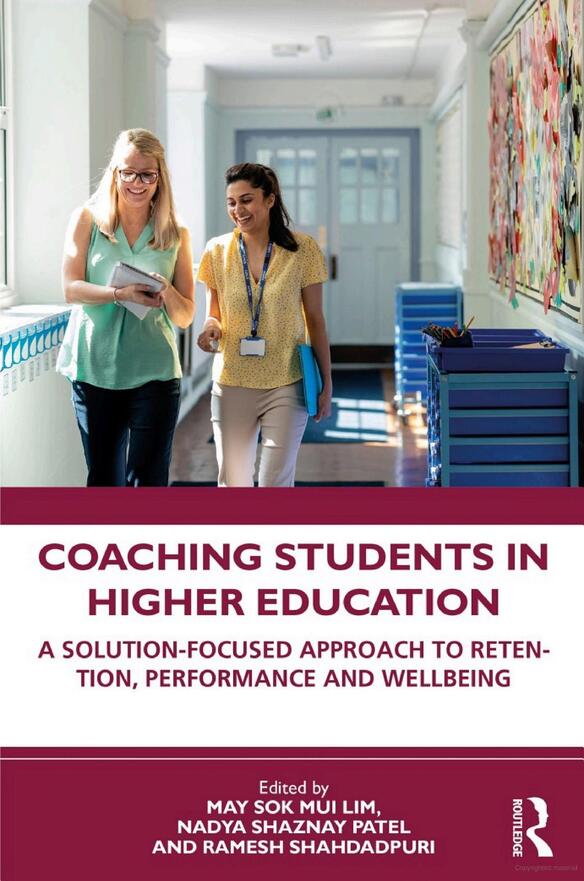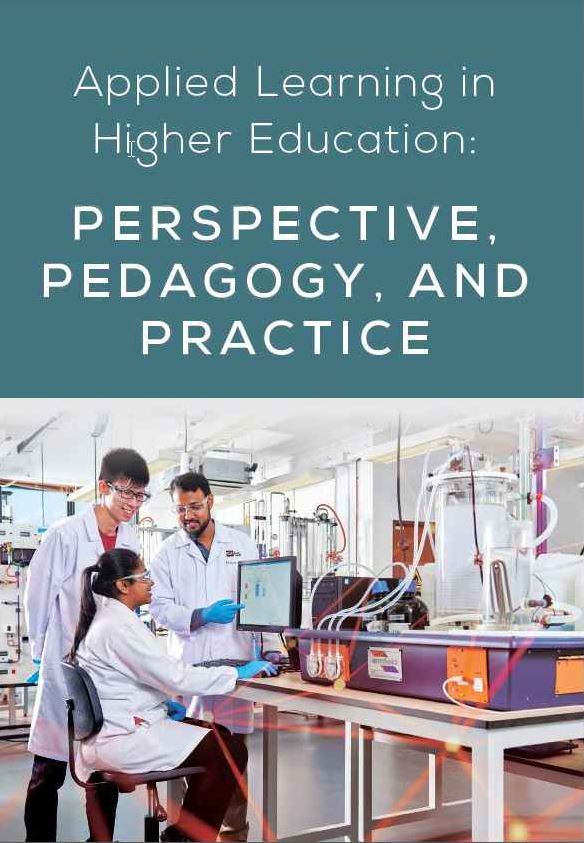
Publications
Highlighted Publication

Coaching Students in Higher Education: A Solution-Focused Approach to Retention, Performance and Wellbeing
Routledge, 2024
May Sok Mui Lim, Nadya Shaznay Patel, Ramesh Shahdadpuri
This practical guide for educators in higher education encourages readers to ask effective coaching questions and apply relevant coaching techniques to empower and engage students to grow and perform at their best.
Filled with authentic examples and handy tips, the book takes readers from the ‘how to’ of coaching, through the practicalities, challenges and honing of existing skills and new capabilities. The authors recognise that in educators’ daily encounters and interactions with students, there are many timely coachable moments for authentic learning. These opportunities can enable students to learn beyond what is squarely in their curriculum and develop their own pathways to become work-ready graduates. Through coaching, educators help students discover more about themselves while guiding them to innovate and generate solutions to perceived and real-world problems. This guide offers in depth discussions along with tools and tips to provide invaluable guidance for educators to get acquainted with the key skills needed to coach students for success in various academic and professional contexts. The content covers multiple varied scenarios, from classrooms and assignments, to internships and group work, and highlights various coaching opportunities with practical strategies.
This is a resourceful text for educators, teachers and professionals working in higher education and learning institutions. It provides training material for institutions that want to conduct faculty development programmes to prepare educators for effective coaching conversations in their universities.

Applied Learning in Higher Education: Perspective, Pedagogy, and Practice
Informing Science, 2020
Sok Mui Lim, Yong Lim Foo, Han Tong Loh, Xudong Deng
Today, “all institutions of higher education almost everywhere in the world have been influenced by the concept of globalisation. The resulting policy changes in each nation-state have, of course, reflected the degree of the impact of globalisation on the country, hence the changes in higher education.” (Banya, 2005, p.147). This points to globalisation shaping knowledge production as well as the spread of intentional and continuous waves of innovation. The effects of globalisation on education can be seen through a) the changing paradigm from a closed system to a more open system, and b) the changing approach from a teacher-centred learning environment to that of a learner-centred environment. This changing approach culminates in the broader ideas of ‘applied learning’ through a) a productive view of learning versus the reproductive view of learning, b) constructivist versus behaviourist, c) learning facilitation versus teaching, and d) process-based assessment versus outcome-based assessment (Rudic, 2016).
All Publications
- Leveraging learning analytics: Assessing the use and impact of a learner profile dashboard for university staffApplied Learning Conference 2025, 2025Shermain Puah, Muhammad Faiezin Bin Osman, Karen Kit Han Wong, Yong En Nah
This evolving project investigates the development, implementation, and adoption of a learner profile dashboard that provide aggregated insights of learner demographics and risk levels of incoming learners every trimester. A dashboard was designed and developed for use by university staff of the competency based education (CBE) programmes of a Singapore-based university. They provide insights to answer these three questions: Who are we enrolling?, Why do they enroll?, and What is their level of readiness? The university staff were either involved in programme management (e.g. Director of programme, programme lead), teaching (e.g. Micro-credential lead, competency unit lead, other instructors/lecturers of the competency unit), or academic support (i.e. Success coaches, educational developers). Given the diverse demographics (e.g. age, industry experience, and completion timelines) of learners in the CBE programmes, and considering that all learners hold full-time employment, it is important for faculty to understand the profiles of incoming learners. This awareness is thought to enable university staff to tailor teaching strategies or provide accommodations, if necessary, to support the specific needs of the cohort. However, providing learning analytics dashboards to stakeholders in a meaningful way that leads to actionable insights is a complex endeavour (Schwendimann et al., 2017). In other words, simply providing stakeholders with dashboards does not necessarily ensure their effective use or adoption in practice. To support engagement with the dashboard, a concise 1-minute instructional video demonstrating how to navigate the dashboard and utilise its features was introduced. Additional short videos to explain the rationale behind concepts relating to learners readiness for university are in development. Furthermore, a collaboration channel will be introduced to serve as a community of practice, to encourage peer learning and the exchange of ideas or use cases of the dashboards. Beyond implementation, this study seeks to explore university staff perceptions of the dashboard to assess their impact and inform future dashboard development. Adopting a quantitative approach, the study employs a survey questionnaire grounded in a framework evaluating impact across six domains desirability, efficacy, equity, usability, affective response, and consistency as well as the Technology Acceptance Model (TAM; Davis, 1989). Data collection is currently in progress, and findings will be presented at the conference upon acceptance. This research has the potential to offer practical insights into the process of designing and implementing dashboards that are both usable and beneficial for university staff, ultimately enhancing their ability to make data-informed decisions in CBE programmes.
- Unpacking socially shared metacognitive regulation (SSMR) strategies in a simulation-based learning environmentApplied Learning Conference 2025, 2025Xiao-Feng Kenan Kok, Jutasompakorn Pearpilai, Eyvonne Yee Wen Yeow, Joey Han Shi Tehn, Man Fei See, May Moe Aung, Nasya Song Lin Chan, Vanessa Man Rou Oh
Recent reforms in accounting education emphasize alternative instructional approaches to equip students with Industry 4.0 soft skills, such as problem-solving, adaptability, teamwork, and communication (Silva et al., 2021; World Economic Forum, 2016). Simulation-based learning tools like ProBanker, enhance these skills by engaging learners in real-world tasks that promote collaboration and metacognitive strategies (Kim et al., 2009; Roland & Buchana, 2014). While research on game-based learning often focuses on cognitive outcomes, metacognitive outcomes, particularly socially shared metacognitive regulation (SSMR), remain underexplored (Hadwin et al., 2017; Jarvela et al., 2019). This study addresses this gap by examining the SSMR strategies undergraduate students employ during weekly discussions over four weeks, while interacting with ProBanker, examining trends in orienting, planning, monitoring, and evaluation. 15 accountancy undergraduates from a Singapore-based university participated in this study as part of the "Financial Institutions and Markets" module. Organized into three groups of five, they used the ProBanker simulation to act as bank managers, making strategic financial decisions weekly. Metacognitive regulation (MR) prompts guided strategy development, such as "What trading strategies did your team use?" and "How did your team check if the trading strategies used were effective?". Weekly team discussions were audio-recorded, transcribed, and coded using a framework adapted from De Backer et al. (2015). MR strategies were identified, categorized as individually oriented or socially shared, and coded, achieving an acceptable minimum interrater agreement of 75% (McHugh, 2012). All groups utilized a full range of SSMR strategies (task analysis, content orientation, interim planning, comprehension monitoring (CM), progress monitoring, and evaluation of learning outcomes and processes (ELOP)) during the four weeks. CM was the most frequently used, highlighting the importance of summarizing and elaborating to understand strategies, consistent with De Backer et al. (2015). ELOP increased over time, reflecting a growing focus on evaluating processes and outcomes. Group differences emerged: Group 2 started with the highest ELOP, likely due to trial strategy evaluations guiding their adoption of SSMR, while Groups 1 and 3 began lower. This suggests that prior experiences could have influenced how teams engaged in SSMR. This study offers valuable insights into SSMR strategies in collaborative learning. CM emerged as the dominant strategy, emphasizing the need for targeted support in active listening, questioning, and collective notetaking. Group 2's higher use of ELOP suggests that trial simulations shaped their strategies, highlighting the importance of prior experiences in SSMR development. Educators should design environments that support CM and foster evaluation skills. Generative AI-drive real-time feedback and adaptive support could deepen metacognitive abilities, such as navigating complex tasks (Tankelevitch et al., 2024). Future research should explore CM strategies: impact, early ELOP's influence on long-term outcomes like deep understanding and team performance, and mediating factors like team cohesion and task complexity.
- Student engagement as a bridge between support and learner satisfaction in blended learning environments at higher educationApplied Learning Conference 2025, 2025Xiao-Feng Kenan Kok, Ching Yee Pua, Shermain Puah, Oran Zane Devilly, Peng Cheng Wang, Eric Chern-Pin Chua
Blended learning integrates online and face-to-face activities, replacing some in-person teaching with meaning online interactions (Dziuban et al., 2016). It enhances efficiency, teaching practices, and outcomes but demands student independence and active engagement (Broadbent & Poon, 2015). Effective design should support autonomy, competence, relatedness, and engagement (Chiu, 2021). While its potential to foster engagement is recognized (Halverson et al., 2012), research on digital support in higher education remains limited (Halverson & Graham, 2019). This study explores a model where teacher and digital support predict engagement (i.e., behavioural, cognitive, emotional, agentic), which subsequently predicts learner satisfaction across interaction dimensions (Gao, 2020).
- Building lifelong learning ecosystems through coaching: Exploring the impact of a coaching intervention on goal-related outcomes55th eucen Annual Conference, 2025Shermain Puah, Sok Mui Lim, Shimin Ngoh, Jing Shi
Lifelong learning ecosystems thrive when universities actively connect learners, educators, and industry to foster continuous professional and personal growth. The lifelong learning movement in Singapore faces challenges in cultivating a culture that emphasises not only skills but also the habits of mind essential for lifelong learning. This study explores how coaching, a highly non-directive and non-advising approach, can serve as a key mechanism in fostering a support ecosystem in the university to enhance academic and personal growth.
An intervention-based study was conducted with workplace learners from the information and communications technology (ICT) discipline. Workplace learners differ from traditional undergraduates in expectations, motivations, and challenges. They face unique challenges, including increased work-related stress, poorer work-study-life balance, difficulty managing the boundaries between personal and professional lives, alongside typical academic pressures.
Participants received coaching from either external professional coaches or internal coach-educators (faculty trained to use coaching skills and coaching conversations) over a nine-month period. A quantitative methodology was adopted using survey data collected at pre-test, mid-point, and post-test to assess goal-related behaviours and aptitudes (i.e. goal attainment, goal competence, goal planning). Additionally, coaching session notes logged by coaches are used to supplement the quantitative findings.This paper and presentation will present our preliminary findings and trends from the partial data set. Repeated measures ANOVA revealed that workplace learners in the Professional Coaching group (N = 27) experienced significant improvements in goal competence, goal planning over time. In the Coach-Educator group (N = 10), significant improvements were observed in goal competence, but other outcomes showed no statistically significant changes. A review of the coaches’ notes revealed that there were clear and concrete action plans discussed in the sessions with professional coaches that were absent with coach-educators. Further analysis indicated that, as a whole, there was increased goal attainment associated with higher goal success rates and a perception of reduced goal difficulty over time, suggesting a positive shift in learners’ motivation and persistence.
Our study explored the complementary roles of different coaching approaches within a university lifelong learning ecosystem. Professional coaches appear to bring out goals that are more focused on professional growth and skill-building, while coach-educators have more conversations on goals surrounding academic performance and academic life. Given that coach-educators are primarily educators with teaching responsibilities, equipping them with coaching skills offers a strategic way to enhance academic success without compromising their core role. By embedding coaching within university structures—through faculty training, industry partnerships, and integrated coaching programs—institutions can create sustainable support systems.
This study underscores the potential for coaching to serve as a bridge between academia and industry, equipping workplace learners with the self-coaching abilities necessary for continuous personal and professional growth. As universities seek to enhance lifelong learning culture, coaching offers a scalable and adaptable strategy to foster resilience, goal-directed behaviour, and learner autonomy. - The mediating role of student engagement in the relationship between teacher and digital support and learner satisfaction in blended learning environments at higher educationBritish Educational Research Journal, 2025Xiao-Feng Kenan Kok, Ching Yee Pua, Shermain Puah, Oran Zane Devilly, Peng Cheng Wang, Eric Chern-Pin Chua
Given the emergence of blended learning as the dominant mode of learning at university in a post-COVID-19 world, the need to examine students' perceptions of blended learning is increasingly becoming more important. This study examined the mediating role of student engagement in the relationship between the types of support (i.e., teacher, digital) and learner satisfaction in blended learning environments. A sample of 674 Year 1 and Year 2 students from a public university in Singapore participated in this study. Structural equation modelling showed that (1) teacher autonomy and digital relatedness support predicted agentic engagement, (2) digital competence and relatedness support predicted emotional engagement, (3) emotional engagement predicted all learner satisfaction facets except for learner–instructor interaction and (4) agentic engagement predicted all learner satisfaction facets except for learner–technology interaction. Of the four dimensions of student engagement, only emotional and agentic engagement mediated the relationships between various dimensions of support and learner satisfaction. Overall, these findings highlight the importance of emotionally engaging students and imbuing a sense of agency in them to enhance the relationships between the types of support and learner satisfaction.
- Quick fix: A vignette-based approach to demystifying the concept of metacognitionCollege Teaching, 2024Xiao-Feng Kenan Kok
Metacognition, the awareness and regulation of one’s cognitive processes, plays a pivotal role in enhancing academic performance. However, teaching this concept effectively poses significant challenges. Common obstacles include the absence of authentic metacognitive elements in learning activities, the narrow scope of reflection activities, and the conflation of cognitive and metacognitive components within tasks. This “quick fix” explores the application of a vignette-based approach to address these challenges and facilitate a deeper understanding of metacognition. It discusses the construction of a vignette grounded in Skilling and Stylianides’ (Citation2020) framework, alongside student responses, and question prompts to engage learners.